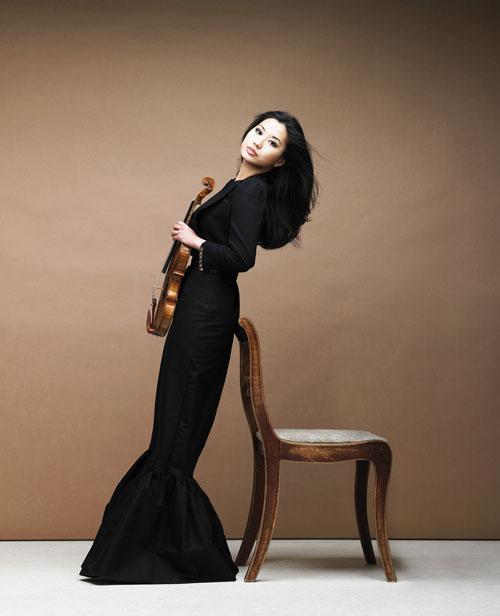Shakespeare's romantic and tragic Romeo and Juliet, with its captivating story of young, forbidden love that ends tragically, has captured the imagination of many composers. The National Philharmonic, led by its Music Director and Conductor Piotr Gajewski, presents three distinct music versions of this eternal story at Strathmore on December 9, 2022 in a program of Tchaikovsky's Romeo and Juliet Overture -- Fantasy and music from Sergei Prokofiev's 1940 ballet Romeo and Juliet. Also on the bill is music from West Side Story, Leonard Bernstein's Broadway classic that explores a similar theme of love and heartbreak between members of rival families. World-renowned violinist Sarah Chang performs the Bernstein work in a version created for solo violin and orchestra. I recently asked Ms. Chang and Maestro Gajewski for their insights into this innovative program.
LC: Each of the featured composers has his own distinct musical language. How did each treat the story and its spectrum of emotions?
SC: This is such a beautiful program because it explores love and tragedy throughout the generations and how, at its very core, even if we all experience our individual emotions in our own unique ways, we are still connected by the common, universal thread of love and humanity.
LC: What role did Bernstein give to the violin? And how does violin interact with the orchestra to create the experience of joy and grief?
SC: Bernstein created one of the most iconic, sensational, instantly recognizable masterpieces in West Side Story. There, unfortunately, wasn’t a solo violin and orchestra version created, so I asked my wonderful friend and Hollywood royalty, David Newman, to arrange Bernstein’s original into a solo violin and orchestra version with the Bernstein estate’s blessing. I am so grateful for this very special arrangement that was specifically created for me, and I love how the solo violin part seamlessly weaves between Maria and Tony’s stories, while still honoring Bernstein’s original work.
LC: You're a favorite guest of the National Philharmonic and its audiences. Do you feel a special connection to them, and how does that manifest itself in your music-making?
SC: I absolutely love working with the National Philharmonic and Maestro Gajewski. We are long-time friends and I have so much respect for my colleagues. We have performed many concerts and explored many different works together, and I am especially grateful to the Maestro for going above and beyond, and reaching out during the pandemic, just to see how everyone was doing. A true friend!
Maestro Gajewski’s remarks on the program:
The story of Romeo and Juliet is full of musical possibilities. Every composer wants to write a love tune or portray conflict, a struggle or even a musical depiction of a violent death. And so it is interesting to compare the different styles.
Tchaikovsky composes an overture which takes on a classic form introducing the two families with the opening tune. This same tune comes back later in a depiction of a dramatic fight. The most famous melody is, of course, the love theme. And the tragic end is pictured with a dramatic timpani outburst, followed by a dirge of sorts.
Bernstein used a musical theater vehicle to write songs (and some dances) that pinpoint the major inflection points of the story. "Tonight," "Maria," "There’s a Place for Us," and many other songs make their way through the suite for violin and orchestra.
Prokofiev composed a ballet which we abbreviate in our performance, but present pretty well in story order, with ten movements starting with a depiction of the Montagues and Capulets, weaving through the balcony scene and a portrait of Friar Laurence and ending with Romeo at Juliet’s Tomb.
In our concert we feature only three composers’ takes on Romeo and Juliet, but there are many, many more to sample outside of the concert.
The performance is Friday, December 9 at 8:00 p.m. at Strathmore. Information at NationalPhilharmonic.org.
Learn more about Leonard Bernstein's West Side Story on Classical Breakdown!
PBS PASSPORT
Stream tens of thousands of hours of your PBS and local favorites with WETA+ and PBS Passport whenever and wherever you want. Catch up on a single episode or binge-watch full seasons before they air on TV.
